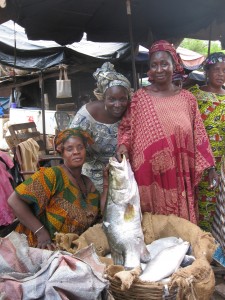Strengthening Value Chains to Benefit Small Producers

Members of the Cooperative Feminins de Transformation et Conservation des Produits de Peche (de Nayaton) in Bamako, Mali (Deborah Rubin)
The CRSPs are working to build efficient and effective value chains across the globe. They have recognized that scientific advances to increase yields without regard to the market can have negative consequences for small producers if it creates a glut on the market and reduces farmers’ returns. As a result, several CRSPs have adopted a value chain approach in their applied research programs.
The AquaFish CRSP has targeted fish farmers on the Kenyan shores of Lake Victoria, providing them with technical assistance in “best practice” fishpond management. Kenyan women, who previously engaged in fish trading and processing are now entering the fish value chain as fish farmers of catfish and tilapia. By producing and selling fingerlings either as baitfish for the large Nile perch fishing industry or to other fish farmers, women can increase their income and overall food security.
A critical part of strengthening value chains lies in providing producers with accurate and timely market information. Several CRSPs have supported activities utilizing mobile technologies to link farmers to markets. Researchers with the Livestock-Climate Change CRSP have been working in Mali to expand a livestock market information system s and to conduct market chain analyses and examine household marketing and migration decision making by pastoralists. Both of these efforts are expected to bring more pastoralists into the livestock markets.
The INTSORMIL CRSP has also adopted a value chain approach. Its researchers mapped the sorghum and millet value chain in Zambia. The lack of improved seed was identified as a major constraint in expanding the market. Other research investigated the value chain of sorghum-based beer manufactured in Zambia. The beer companies source from more than 2,500 small holder sorghum producers.
Access to credit is often a fundamental prerequisite for participation in value chains. In Ethiopia and Ghana, the Global Livestock CRSP formed credit and savings groups that allowed producers to start businesses, e.g., fattening animals for sale and trading in agricultural products.
Also in Zambia, the Pulse CRSP is investigating the supply chains used by the Zambian pulse producers and a description of the characteristics of its actors.
